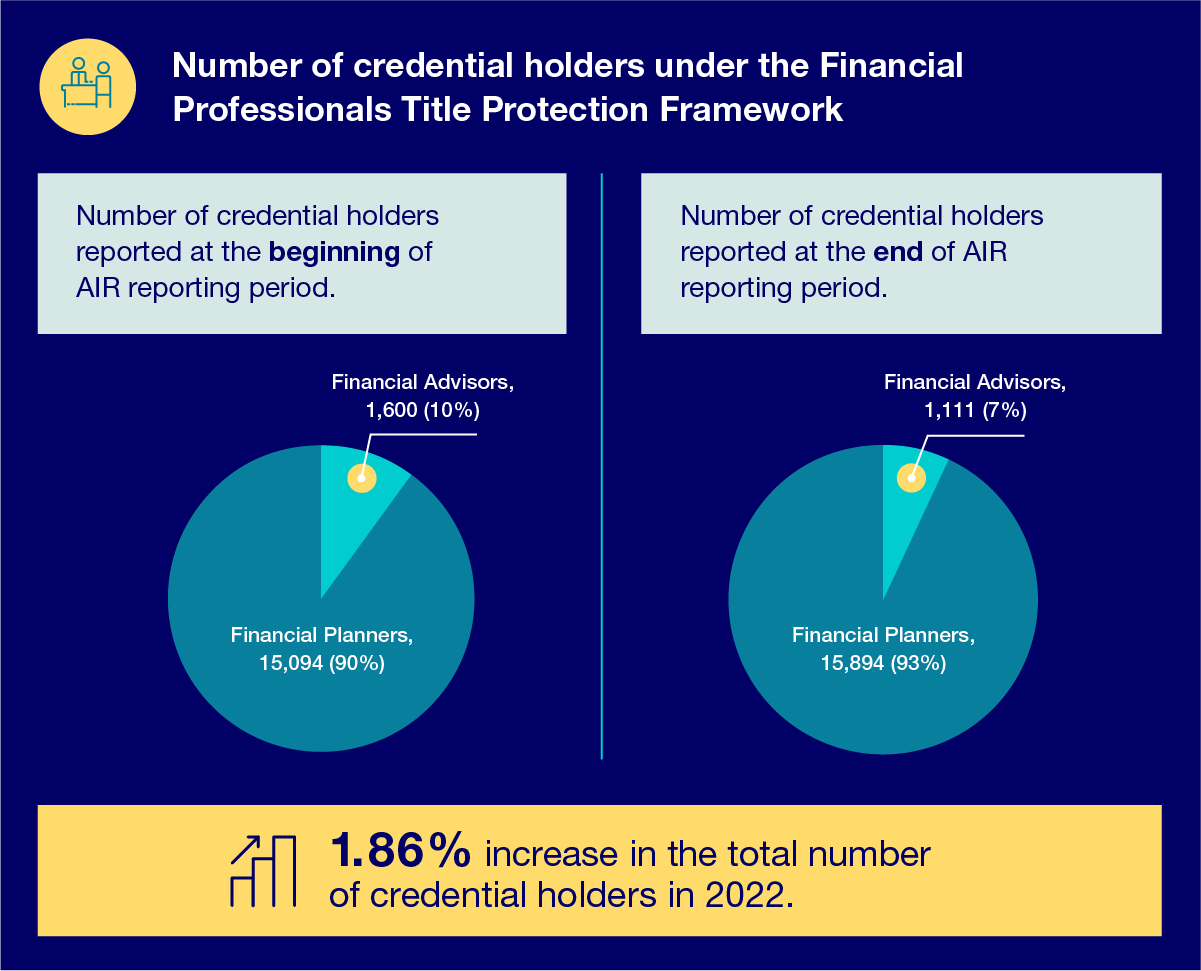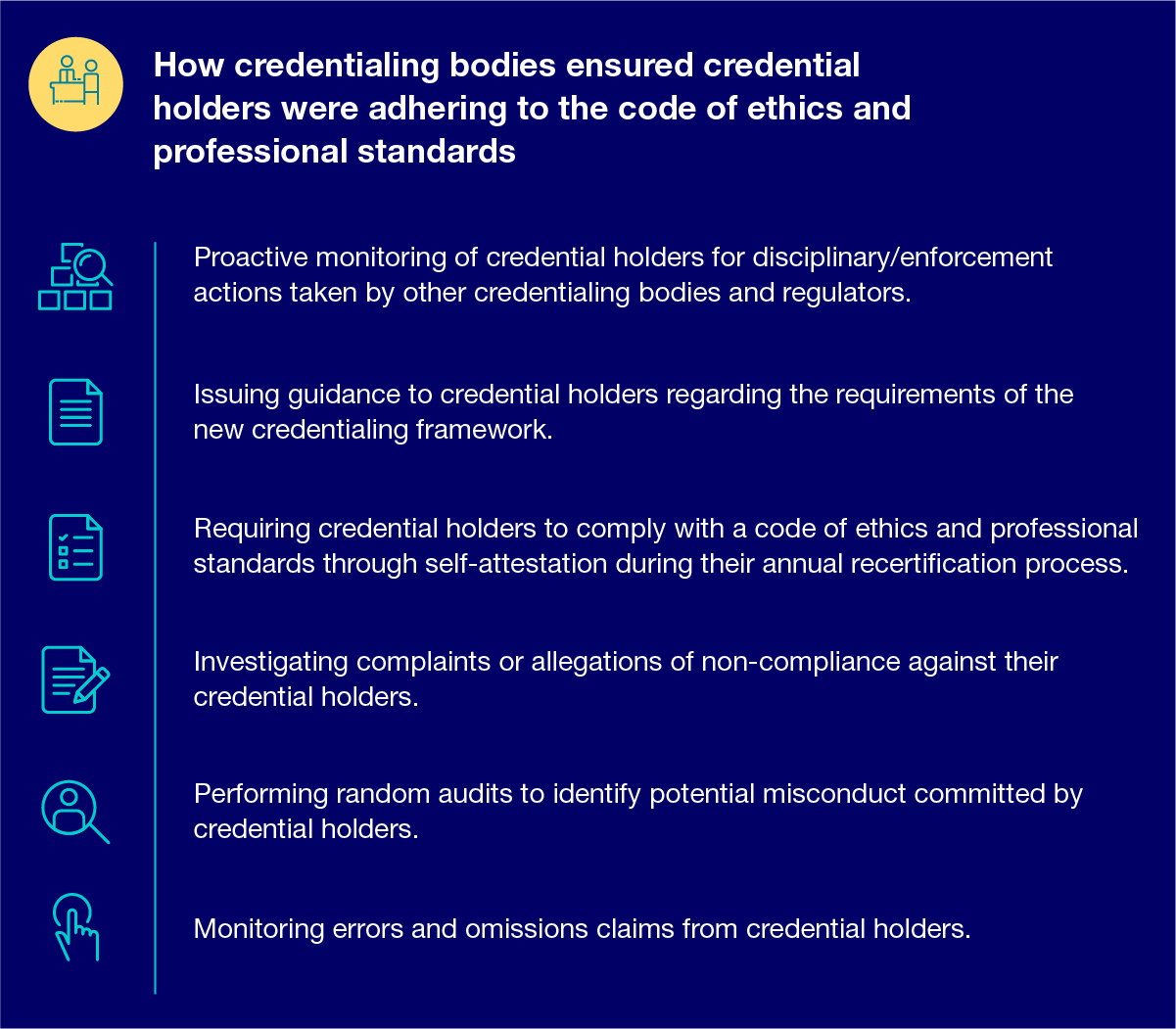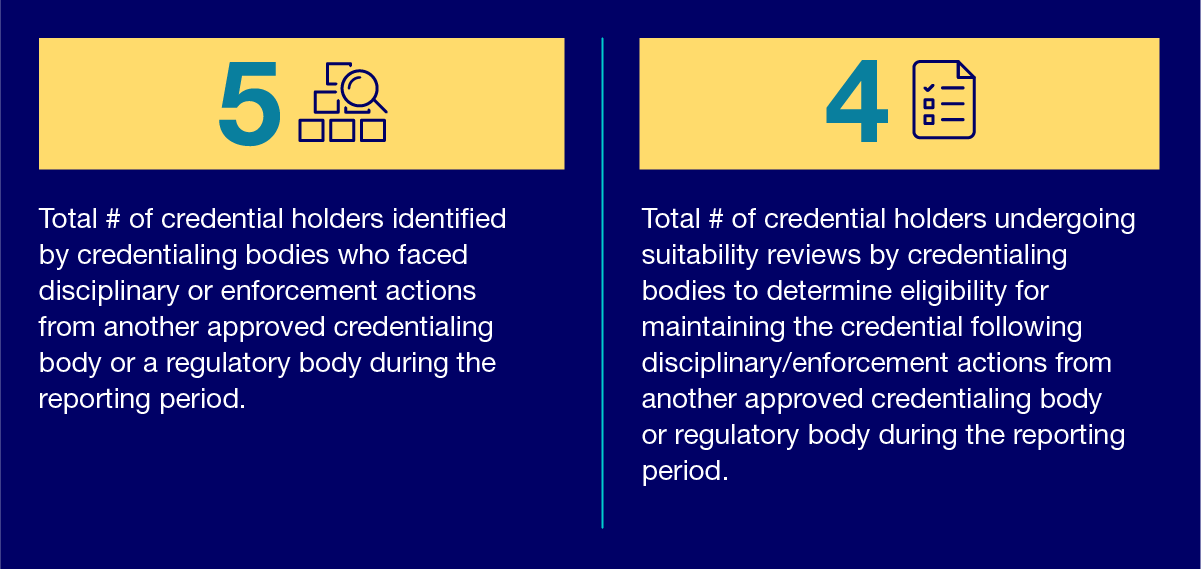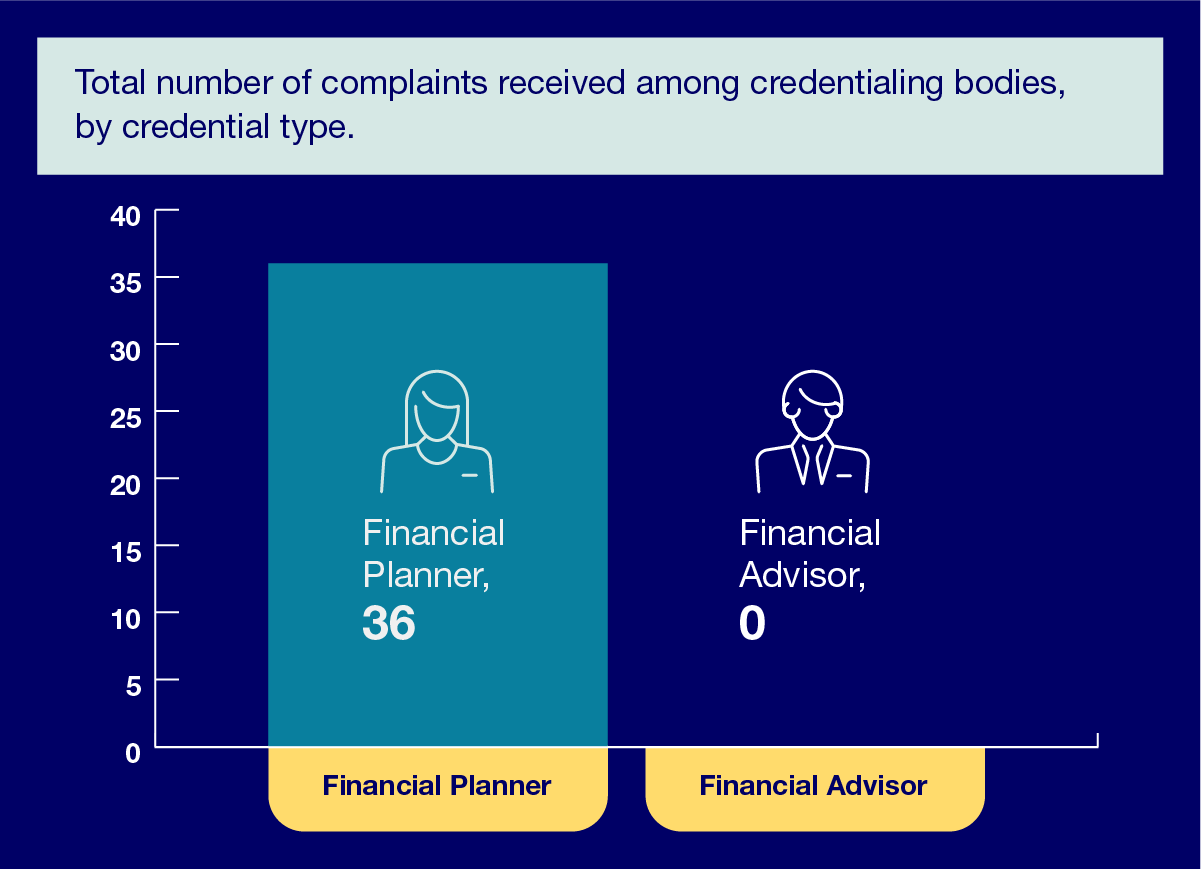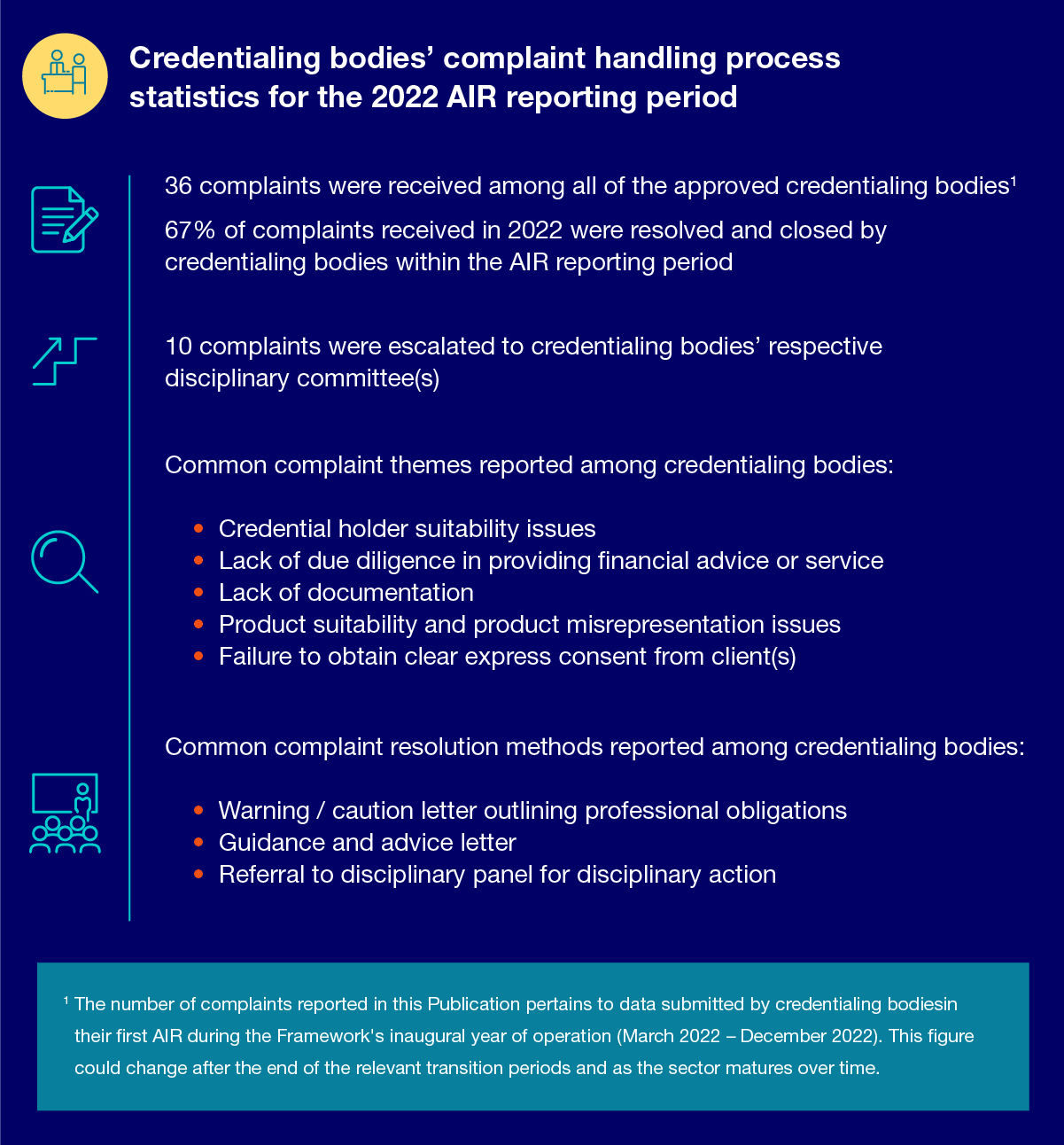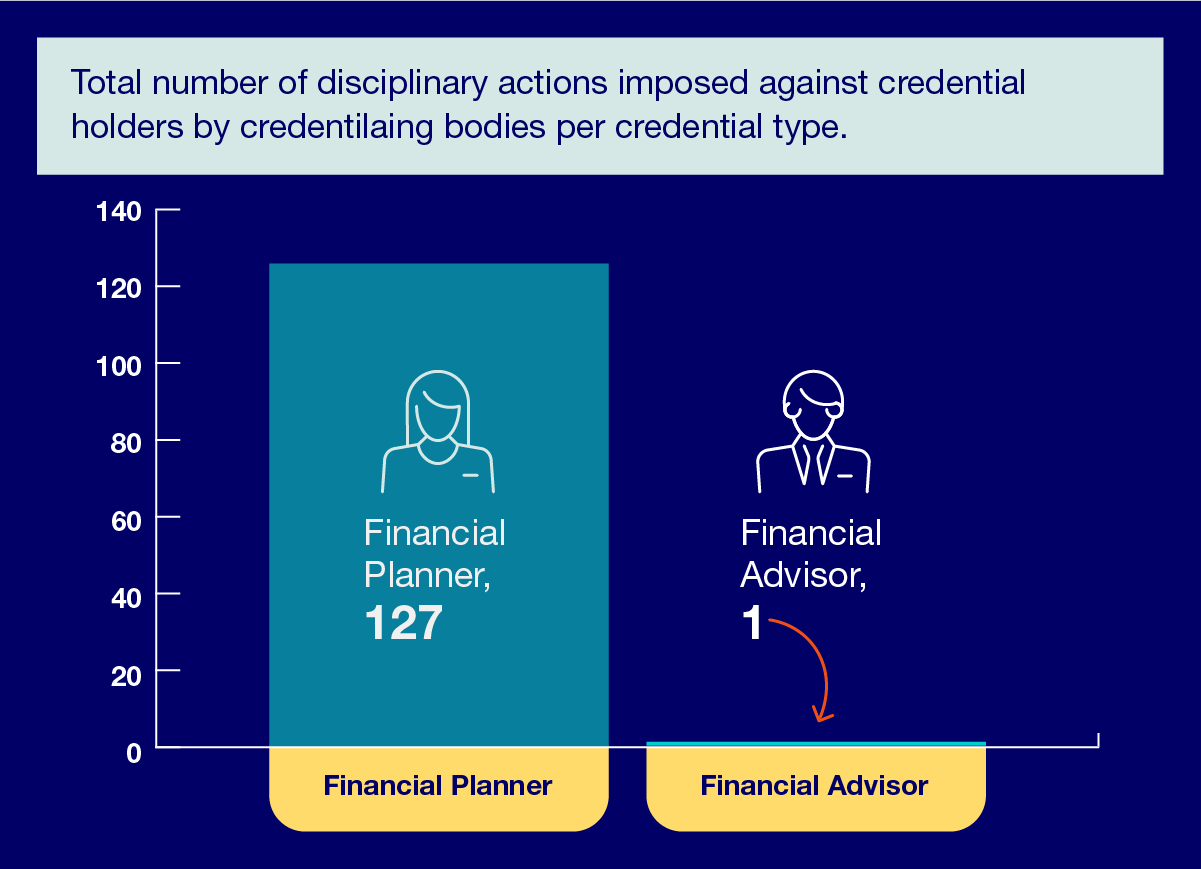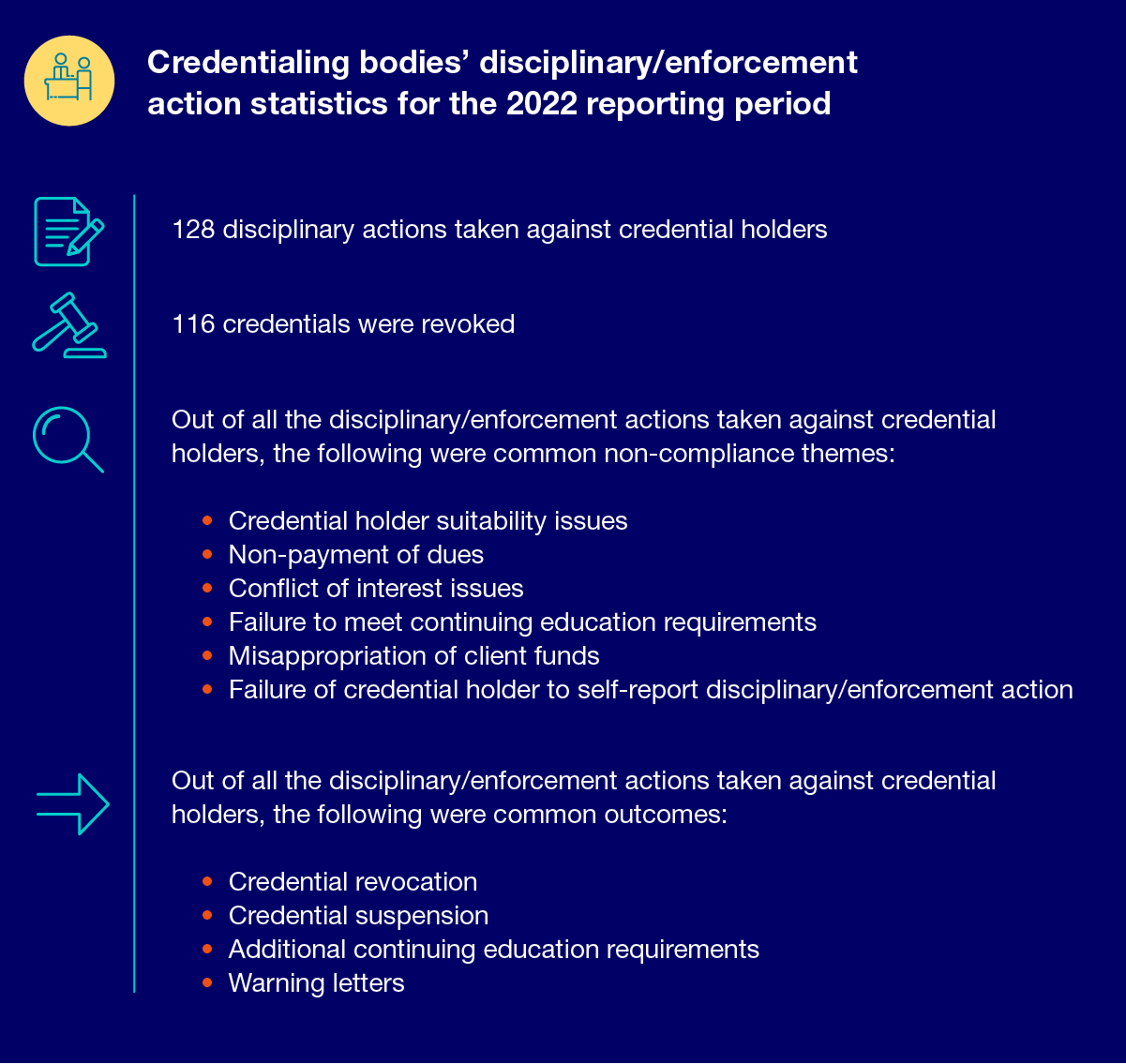Contents
Executive summary
About the Financial Professionals Title Protection Framework
About FSRA
About the Annual Information Return
Credential holders overview
Key observations
Credential holders oversight
Code of ethics and professional standards
Disclosing approved credential(s) to consumers
Public registry of individuals holding approved credentials
Monitoring of disciplinary/enforcement action against credential holders
Monitoring Continuing Education (CE) compliance
Complaint handling process statistics
Disciplinary/Enforcement action statistics
Methodology
Appendix
Executive summary
Many consumers may work with a financial professional to plan for various financial milestones. Having an established minimum standard in place for those using the Financial Planner and Financial Advisor titles can give consumers greater confidence that the individual they are dealing with has a minimum standard of education, is being actively supervised by a credentialing body approved by the Financial Services Regulatory Authority of Ontario (FSRA) and is subject to a complaints and discipline process.
All FSRA-approved credentialing bodies must complete and submit an Annual Information Return (AIR). FSRA’s 2022 Credentialing Body Annual Information Return Report (“Report”) provides an overview of business practices, general title usage information and observed trends within the Financial Planners and Financial Advisors sector. FSRA collected this data from credentialing bodies through the 2022 AIR.
FSRA will use the AIR data to help administer and enforce the Financial Professionals Title Protection Act, 2019 (FPTPA) and update consumer protection measures. FSRA also utilizes AIR data to inform its supervision plans for the sector: FSRA’s 2023/24 Supervision Plan for the Financial Planner / Financial Advisor sector.
Four FSRA-approved credentialing bodies were required to complete and submit the 2022 AIR:
- FP Canada
- Institute of Advanced Financial Education (IAFE)
- Canadian Securities Institute (CSI)
- Canadian Institute of Financial Planning (CIFP)
All four credentialing bodies filed their 2022 AIR by the required March 31 deadline, resulting in a compliance rate of 100%.
FSRA reviewed the AIRs submitted by credentialing bodies to ensure quality and completeness. See the Appendix for a summary of the aggregate responses to the AIR questions.
About the Financial Professionals Title Protection Framework
In Ontario, individuals wanting to use the Financial Planner or Financial Advisor titles must hold an approved credential from a FSRA-approved credentialing body. The Financial Professionals Title Protection Framework (“Framework”) sets out minimum educational, conduct and professional standards for title users, as set out by approved credentialing bodies. This includes adhering to a code of ethics and professional standards that mandates credential holders to prioritize their clients' interests. Credential holders must also meet ongoing continuing education (CE) obligations to maintain their credentials, which ensures they maintain relevant proficiency and qualifications which are consistent with industry standards. Credentialing bodies are also responsible for establishing the frequency and format of CE requirements for their respective credential holders.
Additionally, the Framework requires credentialing bodies to have in place policies, procedures, and administrative practices to effectively oversee individuals holding approved credentials, including investigating consumer complaints and allegations of non-compliance with its code of ethics and professional standards. The credentialing bodies’ complaint handling processes should be well-documented and publicly accessible. Credential holders are also subject to discipline processes, and the Framework requires credentialing bodies to have a disciplinary adjudication process for credential holders that is transparent and impartial.
About FSRA
FSRA is an independent regulatory agency created to enhance public confidence in non-securities financial services and pensions in Ontario.
Part of FSRA’s mandate is to monitor and evaluate developments and trends, and promote transparency and disclosure of information.
About the Annual Information Return
This report summarizes the information provided in the 2022 Annual Information Return (AIR) about approved credentialing body activities during the 2022 calendar year. The AIR collects information about credentialing bodies’ business practices, internal controls, and market conditions for the previous calendar year.
FSRA launched the first AIR for credentialing bodies in January 2023, as part of its supervision program for the Financial Planners and Financial Advisors sector.
Pursuant to the terms and conditions of approval, credentialing bodies are required to complete and submit the AIR by March 31 of each year, with data from the previous year. Credentialing bodies that fail to file the AIR by the March 31 deadline may be subject to regulatory enforcement action(s), such as compliance orders.
The Framework became effective on March 28, 2022. The 2022 AIR reporting period starts on the date on which the credentialing body was approved by FSRA and ends December 31, 2022. For subsequent AIR filings, the AIR reporting period will be from January 1 to December 31 of each year.
FSRA utilizes the AIR to assess whether credentialing bodies continue to meet the minimum standards outlined in the Financial Professionals Title Protection (FPTP) Rule and the terms and conditions of FSRA’s approval. FSRA also leverages the AIR to update consumer protection measures, establish policy direction, provide further regulatory guidance when needed, and take action to address instances of non-compliance. Findings from the AIR will be used to inform FSRA’s 2023/24 Supervision Plan for the Financial Planner / Financial Advisor sector.
FSRA adopts a risk-based approach for examining approved credentialing bodies. This involves reviewing AIR responses to assess risk and identify elements that might require further review during examinations. Based on examination findings, remediation plans may be implemented, or FSRA may issue compliance orders in response to instances of non-compliance.
FSRA-approved credentialing bodies must continue to meet the requirements under the FPTPA, the FPTP Rule and the terms and conditions of FSRA’s approval. FSRA encourages credentialing bodies to visit the Financial Planners and Financial Advisors Industry section on FSRA’s website to learn more about their legal obligations and other relevant FSRA publications and resources for the sector.
Credential holders overview
Key observations
- All credentialing bodies reported that they charged Certification Fees for their FSRA-approved credentials. These fees range from $100 to $670, while Recertification Fees ranged from $99 to $520.
- Two credentialing bodies confirmed they included the cost of the first examination attempt in their credential Certification Fees, resulting in no separate Examination Fee being reported in the 2022 AIR. However, the other two credentialing bodies charged Examinations Fees ranging from $150 to $950.
Credential holders oversight
FSRA has authority to oversee approved credentialing bodies, as defined by the FPTPA. This includes ensuring they continue to meet requirements outlined in the FPTP Rule and adhere to the terms and conditions of FSRA’s approval.
It is the responsibility of credentialing bodies to oversee the professional conduct and activities of individuals holding approved credentials.
As such, credential holder oversight refers to the outcomes of credentialing bodies’ policies, procedures, and administrative practices to oversee the conduct of credential holders reported in the 2022 AIR.
Code of ethics and professional standards
As part of their policies and procedures, credentialing bodies must require their credential holders to comply with the credentialing body’s code of ethics and professional standards. The FPTP Rule requires that a credentialing program must be designed and administered to ensures that individuals using the credential “deal with clients competently, professionally, fairly, honestly and in good faith.” FSRA believes that part of meeting this standard of care is to prioritize (i.e., “put first”) the interests of a client when preparing a financial plan or providing financial advice. To further support this principle, the FPTP Administration of Applications Guidance requires that a credentialing body code of ethics or professional standards includes a requirement for credential holders to put the client’s interests first.
In the 2022 AIR, all the credentialing bodies confirmed that they:
- required their respective credential holders to attest to a code of ethics and professional standards during the reporting period
- included a requirement in their code of ethics and professional standards for their respective credential holders to put their clients’ interests first
- have consistent mechanisms to ensure that all credential holders adhered to the code of ethics and professional standards during the reporting period
Disclosing approved credential(s) to consumers
As set out in the FPTP – Administration of Applications Guidance, credentialing bodies must also have in place policies and procedures that require credential holders to disclose their approved credential(s) to consumers in a clear and timely manner.
In the 2022 AIR, all the credentialing bodies confirmed that they:
- mandated their respective credential holders to properly disclose their credential(s) during the reporting period
- fulfilled the obligation to disclose credentials to consumers, either by integrating it directly in their code of ethics and professional standards and/or through self-attestation during certification and recertification processes
Public registry of individuals holding approved credentials
The FPTP Rule requires credentialing bodies to make publicly available on their website a current list of individuals holding approved credentials.
- All credentialing bodies reported that they regularly and promptly updated their public registry during the reporting period.
Monitoring of disciplinary/enforcement action against credential holders
As set out in the FPTP – Administration of Applications Guidance, credentialing bodies are required to monitor for any disciplinary or enforcement action imposed against their credential holders by another approved credentialing body and/or by a regulator.
- In summary, credentialing bodies reported the following methods of proactively sharing public disciplinary information:
- publicly posting disciplinary actions on their website
- directly informing other credentialing bodies/regulators when any of their credential holders face disciplinary actions from the reporting credentialing body
- All credentialing bodies reported that they proactively monitor their own credential holders for disciplinary/enforcement actions taken by other credentialing bodies and/or regulators.
Monitoring Continuing Education (CE) compliance
As set out in the FPTP Administration of Applications Guidance and the FPTP Rule, credentialing bodies are required to establish a CE program for their credential holders with clear guidelines regarding its format and frequency. The educational requirements for CE must align with the technical knowledge requirements outlined for the use of the Financial Planner and Financial Advisor titles.
CE is an essential tool that allows financial professionals to stay up to date with the latest advancements and best practices within the financial services industry. It also helps financial planners and financial advisors to ensure continued qualification and adapt to evolving industry trends and regulations, enhancing their competence, and enabling them to provide better outcomes for their clients.
- All credentialing bodies reported having procedures in place to ensure compliance with CE requirements for all credential holders, including auditing mechanisms.
Complaint handling process statistics
Credentialing bodies are responsible for overseeing the professional conduct and activities of individuals holding approved credentials.
The following complaint handling statistics refer to the data reported by credentialing bodies with respect to their complaint handling processes during the 2022 AIR reporting period.
The table below provides a summary of the complaints received by credentialing bodies against their respective credential holders in 2022.
Disciplinary/Enforcement action statistics
Credentialing bodies are responsible for overseeing the professional conduct and activities of individuals holding approved credentials. It is also part of their role to impose disciplinary/enforcement actions against credential holders for misconduct and/or non-compliance with their code of ethics and professional standards.
The FPTP Rule requires that credentialing bodies have well-functioning complaint-handling and disciplinary processes. These processes enable credentialing bodies to address public complaints effectively and, when required, impose disciplinary actions against their credential holders.
Furthermore, the imposition of disciplinary actions may not only originate from the complaints received by the credentialing bodies, but also as a result of the credentialing bodies’ policies and procedures related to the oversight of their credential holders. For instance, credentialing bodies may impose disciplinary action(s) against credential holders that fail to meet CE requirements, fail to pay annual dues, and fail to disclose disciplinary actions imposed against them by another credentialing body and/or regulator.
As such, disciplinary/enforcement action statistics refers to the statistical data reported by credentialing bodies with respect to their disciplinary review process reported in the 2022 AIR.
The table below provides a summary of the disciplinary actions imposed by credentialing bodies on their respective credential holders in 2022.
Methodology
Filing period: The 2022 AIR was made available to all four (4) approved credentialing bodies on January 16, 2023. All four (4) approved credentialing bodies submitted the 2022 AIR by the deadline of March 31, 2023.
Error detection: Data was subjected to quality checks to detect errors that appear to be clear and obvious. Both qualitative and quantitative data may have been adjusted to facilitate aggregation.
Data accuracy: The 2022 AIR gathered data from all four (4) approved credentialing bodies. The credentialing bodies filed the AIR by email to a designated FSRA mailbox. The information provided in the AIR is subject to data validation checks and FSRA follows-up with credentialing bodies, as necessary.
Appendix
Appendix data [XLSX]
